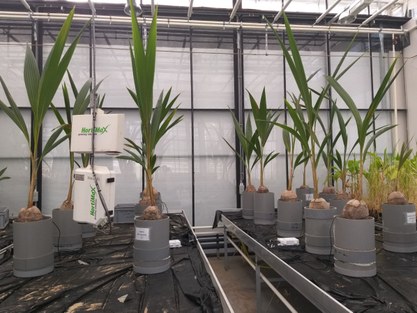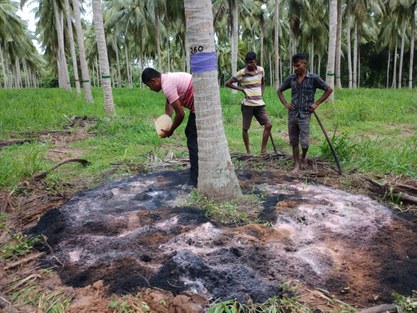Biochar as soil conditioner in coconut plantations: effects on nutrient availability and plant-growth promoting soil biota
Inherent low fertility status of the soils in humid tropical region, and continuous degradation of agricultural soils due to poor management practices have resulted in productivity decline in cropping lands. Coconuts being the second most important food crop in the Sri Lankan’s diet, the low fertility levels of the coconut growing soils in Sri Lanka have threatened the self-sufficient production levels. Maintaining an appropriate level of soil organic matter and biological cycling of nutrients is important to sustainably improve these low fertile soils. Attempts to significantly increase soil organic carbon content through application of various types of manures, compost and green manure are most often short-lived due to the high rates of microbial mediated decomposition in tropics. To overcome these limitations and manage the soil fertility, application of carbon-rich pyrolysed exogenous organic matter (so termed - biochar) may form one promising alternative because it has a very long residence time in soil for decades to hundreds of years. There are many recent research findings to prove that biochar is an effective soil amendment to increase soil nutrient availability as well. Higher nutrient availability for plants is the result of both the direct additions by the biochar and greater nutrient retention, but it can also be an effect of changes in soil microbial dynamics as there are evidences to show biochar changes the soil microbial community and abundance. However, the influence of biochar on beneficial functional groups and its influence on soil fertility have yet to be explored. Thus, this study aims to assess the potential use of biochar as a soil amendment to improve the soil fertility status of coconut growing soils in Sri Lanka with special emphasis is on plant-biochar-microbe interactions in the coconut rhizosphere. The research comprises of an elaborative field trial conducted in Sri Lanka, root-exclusion greenhouse pot-experiments with coconut seedlings and a laboratory incubation study conducted in Belgium. Two different types of biochar, which were produced on farmer-scale level, are tested in this research. The microbial mediated nutrient availability, and the influence of biochar on beneficial functional groups of microbes are being measured by the means of isotopic signatures (15N, 13C), Phospholipid fatty acid (PLFA) biomarkers, plate culture techniques, soil and plant nutrient analysis in this research.

